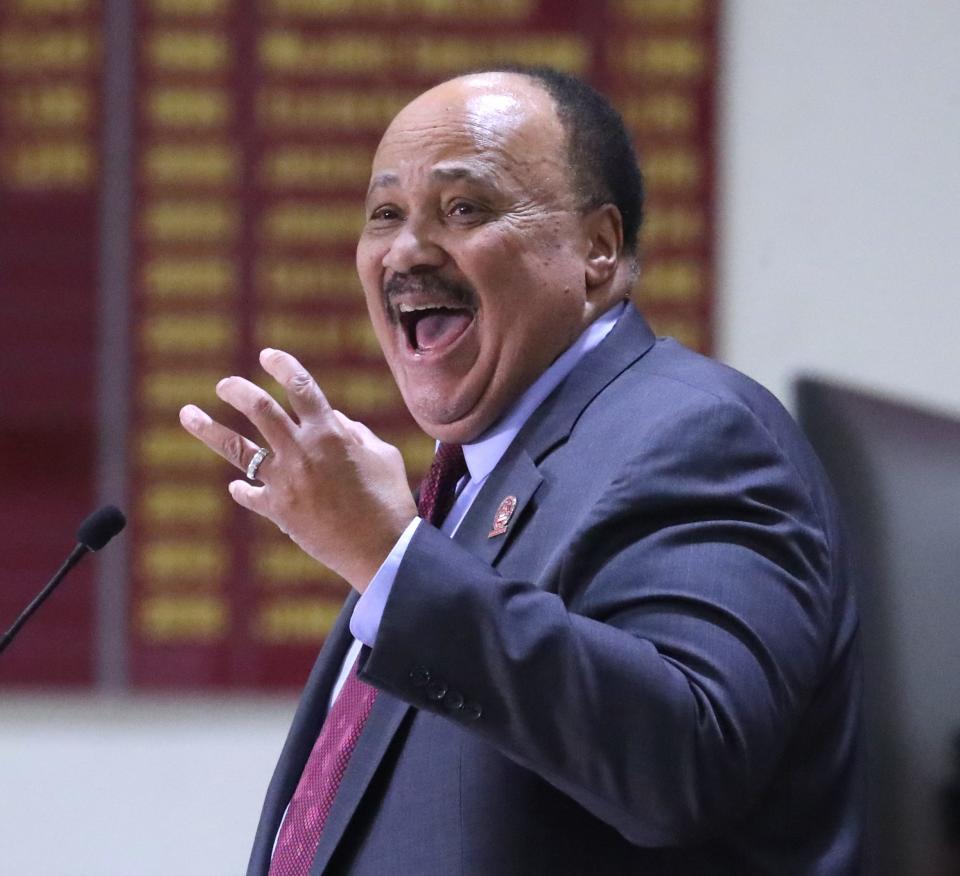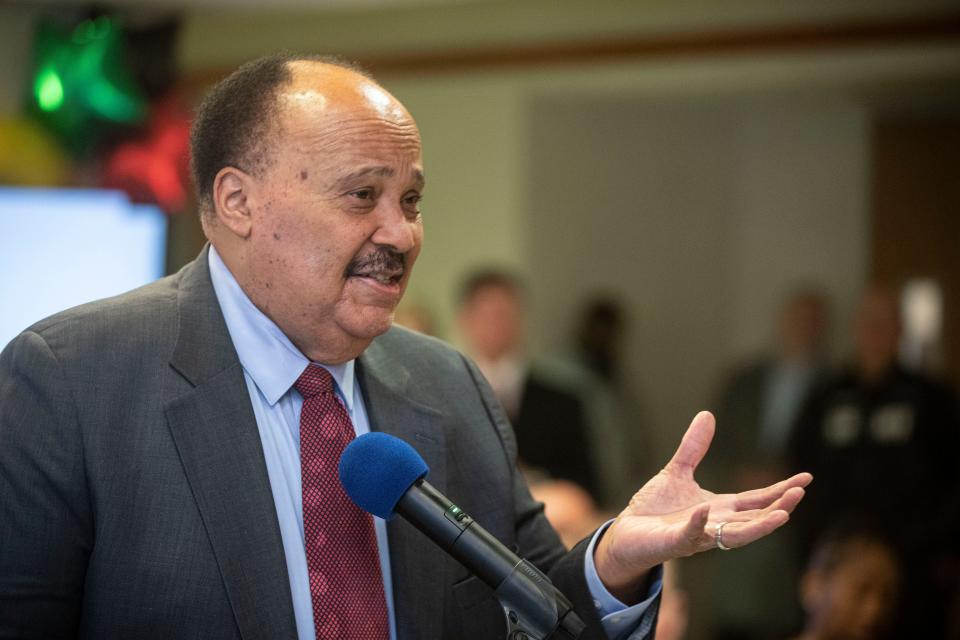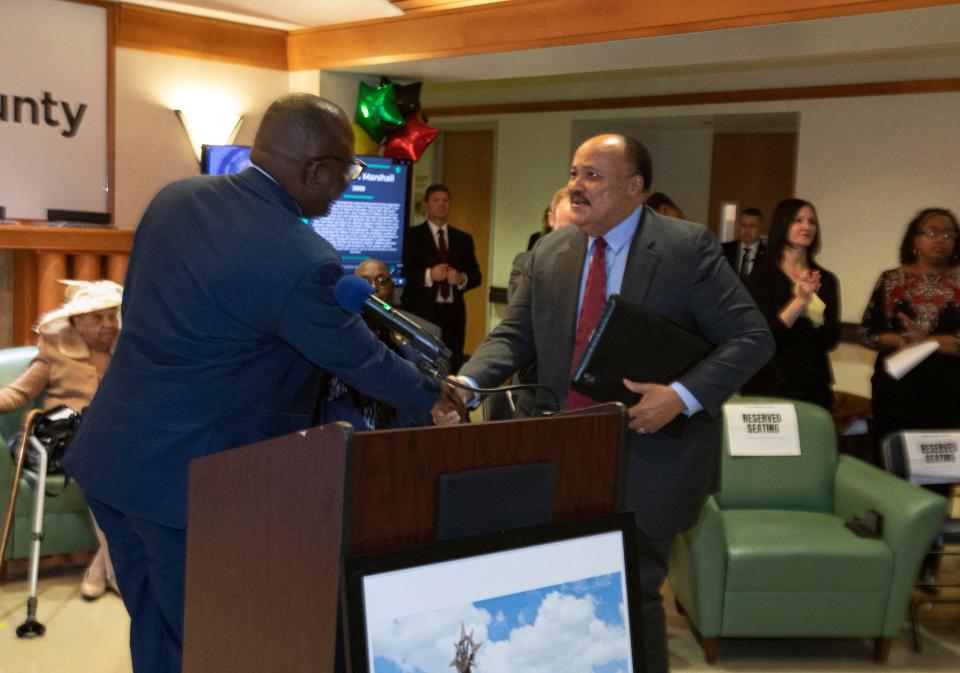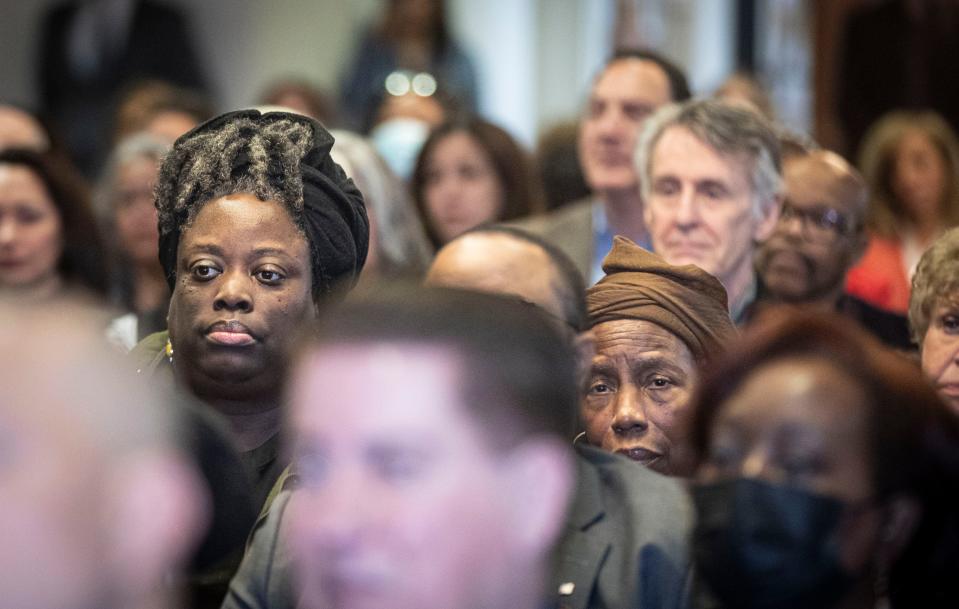Martin Luther King III delivers message of change, racial justice in Rockland
- Oops!Something went wrong.Please try again later.
- Oops!Something went wrong.Please try again later.
- Oops!Something went wrong.Please try again later.
Martin Luther King III, eldest son of civil rights champions the Rev. Dr. Martin Luther King Jr. and Coretta Scott King, took residents at two Rockland venues on Monday through history and gave a message of change.
King regaled his audiences with stories of his parents, and civil rights exploits, providing markers of progress for the justice movement his grandfather and parents played an integral role in the 1950s, the 1960s, and beyond.
He spoke before those attending the inductions into the Rockland County Civil and Human Rights Hall of Fame in the morning.
During the afternoon at St. Thomas Aquinas College, King shared his family stories and views on civil rights advances and retreats over the decades before several hundred people - many of whom were students - during a Fireside Chat at the college in Sparkill. The audience gave him three standing ovations.
"Progress has been made," he said. "There were periods of time in our history when we made huge strides."
He cited the civil rights protests and boycotts of segregated facilities of the 1950s and 1960s and the passage of laws such as the Civil Rights Act, the Voting Act, and the Fair Housing Act.
He also noted with some despair that officials have since curtailed many of those reforms that empowered people of color and poor folks, including voting, affirmative action, and housing.
He said the 1970s became a decade to regroup following the murders of President John F. Kennedy, Medgar Evers, as well as his father, and Sen. Robert F Kennedy months apart in 1968.
King noted states and courts have eviscerated voting rights, such as his home state of Georgia making it a misdemeanor "crime to provide water for people standing in line to vote." The closing of polls in non-white areas and lessening of early voting.
He spoke about the racial and ethnic anger that has surfaced- especially in response to Barack Obama becoming the first black president of the United States on Jan. 20, 2009. He said Obama, who served eight total years after being re-elected, and his family brought pride and dignity to the office and represented all people, compared to the divisiveness since the presidency of Donald Trump.

"We're a better nation when we have dignified dialogue," King said. "We can disagree without being disagreeable."
King spoke about the importance of education and teaching the American history of Blacks, Europeans, Native Americans, and other groups. He said his appearance in Rockland came during Black History Month and on President Abraham Lincoln's birthday.
He noted what's not taught enough is the founding of the nation - noting only two of the first nine presidents - John and John Quincy Adams of Massachusetts - didn't own slaves. He said the founders also denied rights to women - the people who were their mothers.
Education should be about learning the history and cultures of all communities, to combat racism and antisemitism like Holocaust denial, homophobia, and other bigotry.
"Many people say the past is the past," he said. "I guess that allows them to ignore the festering injustices of our times.
"We don't learn if we're not taught," King said, telling the students he saw a room filled with unlimited potential and, like his father, they should research on their own to supplement what they learn in the classroom.
King appears at Civil & Human Rights Hall of Fame ceremony
Before appearing at STAC, King became the guest of honor at the Rockland Civil and Human Rights Hall of Fame induction at the Rockland Health Complex in Pomona.
During his speech, he spoke of his parents.
"My parents knew that many of the great changes that they were working for would not be achieved during their lives," he said. "But through all of the setbacks, tragedies and disappointments, they kept on working with faith and commitment. That's what leadership is all about."

King was honored by the Rockland County Civil Rights Commission for his humanitarian work and continuing the legacy of his parents. At the Hall of Fame event, King spoke about continuing his father's legacy in the face of a changing political climate in America and the importance of making small changes.
King was just 10 years old when his father was assassinated on April 4, 1968, in Memphis, Tennessee, after supporting a sanitation workers strike.
He went on to become a civil rights leader and human rights activist himself after he graduated from Morehouse College, his father and grandfather's alma mater, in 1979.
"After my father was assassinated, my mom made sure that I, and my brothers and sisters, understood that the struggle for racial justice would be a lifelong project for each of us," King said. "Through his example and her determination, they taught us about the transformative power of non-violent social change; the strategy which won all of the great victories of the modern civil rights movement.”

King's father came to Rockland County along with U.S. Supreme Court Justice Thurgood Marshall, then legal director of the NAACP, in 1943 to visit the Brook School in Hillburn, whose students were facing segregation and poor school conditions.
Marshall fought for the desegregation of the school and one other in Hillburn. The case became a precursor to the historic 1954 decision Brown v. Board of Education.

Inductees into the Rockland County Civil and Human Rights Hall of Fame:
Nikki Hines, local Black Lives Matter activist and president of the Nyack NAACP.
Vivian England, current liaison to the Chair of the Rockland County Legislature and former executive director of the Center for Safety and Change
Joseph Coe, board member of the Rockland County Pride Center
Andrea Myer-Winograd, Executive Director of the RCC Holocaust Museum.
Steve Lieberman covers government, breaking news, courts, police, and investigations. Reach him at slieberm@lohud.com Twitter: @lohudlegal
Read more articles and bio. Our local coverage is only possible with support from our readers.
This article originally appeared on Rockland/Westchester Journal News: Martin Luther King III delivers message of change in Rockland

